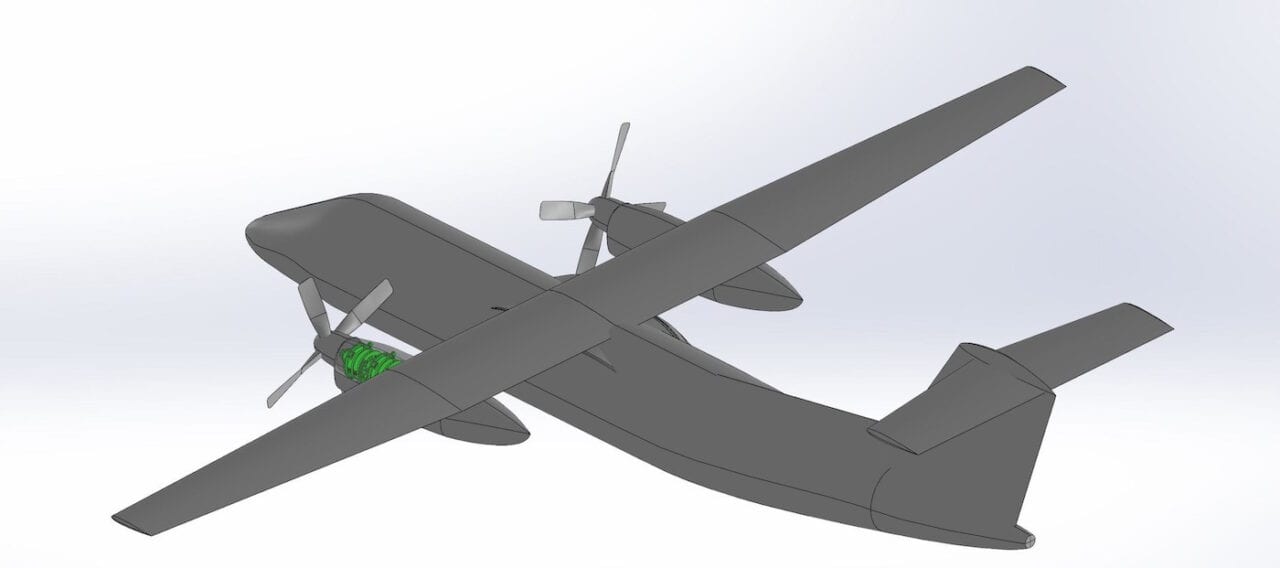
magniX has been selected as the electric propulsion Provider for Universal Hydrogen’s carbon-free aircraft. (magniX)
California green energy startup Universal Hydrogen has established a partnership with Redmond, Washington-based magniX to supply the electric propulsion system as part of a retrofit conversion kit for the De Havilland Canada DHC8-Q300.
Universal Hydrogen describes itself as an end-to-end logistics company, lead by a team of former UTC executives that left the company after the Raytheon merger including Paul Eremenko and Jason Chua. Their concept of operations envisions using the global intermodal freight network to eliminate the need for infrastructure and provide hydrogen power for passenger-carrying regional airline flights in the near future.
The retrofit conversion kit being developed by Universal Hydrogen for the Dash 8 is part of their goal to promote near term adoption of hydrogen power for commercial aircraft. Under the partnership with magniX, they have now secured the motors, inverters, and motor controllers as part of their full hydrogen fuel cell powertrain.
Rather than trying to develop the infrastructure required to store, develop and distribute hydrogen, Universal Hydrogen has developed a specialized capsule that converts hydrogen to dry freight enabling transportation from the point of consumption to airports where aircraft need refueling. Their design takes advantage of the concept of intermodal freight, which uses containers that can be transported through a variety of vehicles including ships, semi-trailer trucks, and trains.
“magniX is responsible for the 2MW-class electric propulsion systems,” magniX CEO Roei Ganzarski told Avionics International.
Ganzarski said the use of hydrogen power as compared to a lithium-ion battery can enable the use of the cleaner energy source on larger aircraft.
“magniX provides the electric propulsion systems that take electricity as input, and provide propeller torque as output. From our propulsion perspective, there is no difference between the source of the electricity. With that said, the hydrogen fuel cell technology is enabling the electrification of much larger aircraft like the Dash-8 or ATR42 which is very exciting as this opens up a much larger operational envelope,” Ganzarski said.
magniX already has leadership ability to provide electric power on smaller turboprop aircraft, including the eBeaver that started flying with Harbour Air in December 2019, and the eCaravan that started flying in May 2020.
The company’s 750-horsepower Magni500 propulsion system powered an eCaravan flight in May for a 30-minute flight, climbing to 2,500 feet. According to Ganzarski, the system they will provide to Universal Hydrogen features a power electronics suite capable of collecting data about its performance for analytical purposes.
Universal Hydrogen’s co-founder and CTO J-P Clarke said he does not envision the need for specialized avionics or flight instruments to be developed as part of the Dash 8’s hydrogen power retrofit conversion kit.
“We anticipate that many of the same metrics that we monitor today for existing engines and Jet A will remain. For example, we will display various temperature, pressure, speed, and fuel metrics,” Clarke said. “In the case of our hydrogen-electric powertrain, we’ll also monitor the dynamics of the powertrain, to ensure we can appropriately identify issues and raise alerts. To mitigate the formation of contrails, we plan to incorporate atmospheric condition sensing capabilities into our system. This will enable decisions of when to store the fuel cell water vapor emissions in onboard tanks, and when to release them.”